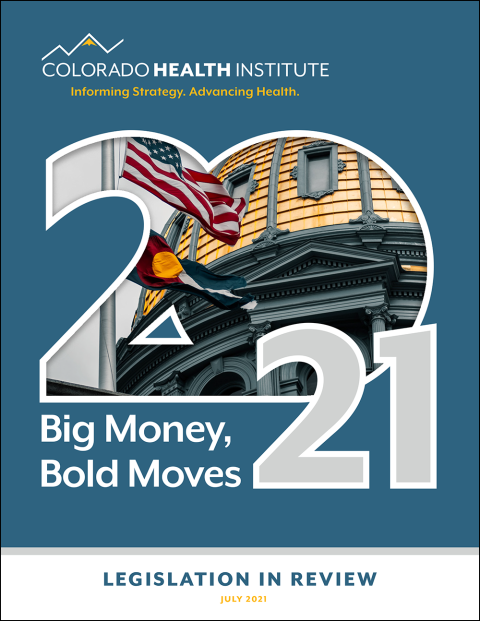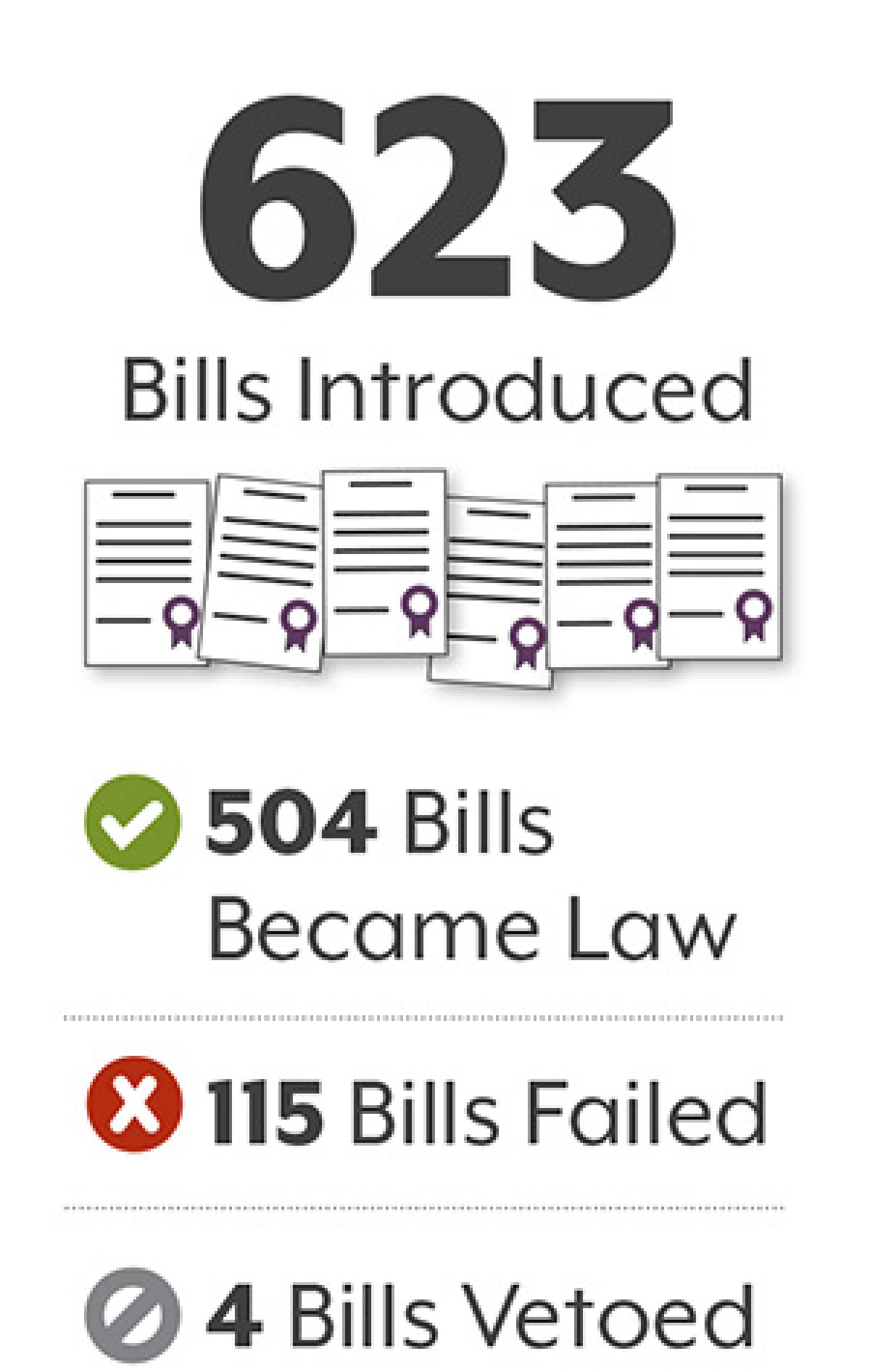THEMES AND BILLS
Bills Respond to Pressing Issues of Today
Sometimes the origin stories of bills can be murky. Other times, legislation is a clear response to recent events and calls to action. In 2021, many bills fell into that latter category, with Colorado legislators introducing measures responding to major social, political, environmental, and health issues of today.
Police Violence and Racial Justice
Last year was marked by renewed outrage over police violence against Black Americans, including a young Aurora resident named Elijah McClain. In 2019, McClain was walking home from a convenience store when someone called 911, saying he looked suspicious. McClain was subsequently placed in a chokehold by police and injected with ketamine, a powerful sedative, by paramedics on the scene. He went into cardiac arrest while being transported to the hospital and died three days later.
The legislature passed several new laws in response to police violence. House Bill (HB) 1251 limits the use of ketamine outside of a hospital. HB 1122 establishes a commission to improve first responder interactions with people with disabilities. And HB 1250 builds on last year’s landmark police reform bill, Senate Bill (SB) 20-217, adding protections for whistleblowers and requiring investigations into use-of-force cases, among other measures.
Firearms and Gun Deaths
Gun policy has long been contentious in Colorado. Legislators introduced a wide array of firearm-related bills this year. Some measures sought to relax existing gun policies; others aimed to strengthen them.
Republicans introduced five bills right out of the gate, including HB 1038, which would have allowed people with concealed carry permits to carry guns on school grounds, and HB 1070, which would have reversed a prohibition on selling and owning certain large-capacity ammunition magazines. All five measures died in committee hearings.
Democrats, meanwhile, introduced three gun-control measures early in the session. Then in March, a gunman shot and killed 10 people at a King Soopers in Boulder, prompting Democrats to introduce an additional three bills to strengthen Colorado’s gun laws. Less than two months later, a mass shooting in Colorado Springs left seven people, including the shooter, dead.
In the weeks following these dual tragedies, Democrats made historic movement on gun control. Legislators passed six measures to strengthen Colorado’s gun laws, including SB 256, which allows local governments to pass gun control laws for their jurisdictions; HB 1299, which creates the Office of Gun Violence Prevention; and HB 1298, which adds certain misdemeanor convictions, such as bias-motivated crimes or sexual assault, to the list of crimes that prohibit someone from buying a gun.
Wildfires and Drought
In recent years, Colorado has experienced some of the worst wildfires and drought conditions in the state’s history.
Policymakers from both sides of the aisle responded with legislation related to wildfire prevention, water management, and climate change, including SB 54, which allocates $13 million to wildfire prevention and recovery, and HB 1242, which creates the Agricultural Drought and Climate Resilience Office under the Department of Agriculture.
Support for Students
The pandemic forced students to navigate remote and hybrid learning while diminishing opportunities to interact with friends, teachers, and other adults outside of their homes.
Several new laws address students’ unmet mental health needs and attempt to make up for lost learning time. HB 1258 sets up a temporary program to screen children and youth for mental health needs that may have emerged during the pandemic and provides eligible students with up to three mental health counseling sessions. HB 1234 creates grants for tutoring programs that address student learning loss due to the pandemic. SB 13 directs the Colorado Department of Education to create a bank of resources aimed at countering learning loss, and HB 1259 streamlines the process for creating expanded learning opportunities such as summer school, extended school days or weeks, and social-emotional supports for students.
Broadband and Telehealth
The pandemic also underscored the need for infrastructure that can support Coloradans’ needs in the digital age, including the ability to access telemedicine, work from home, and learn remotely if needed.
Legislators passed several bills — some with bipartisan support — to expand access to broadband internet in Colorado, including SB 60, HB 1109, and HB 1289.
On the telemedicine front, the passage of SB 139 means insurance companies are required to cover some teledentistry services. And HB 1256 tasks the Department of Health Care Policy & Financing (HCPF) with creating new rules for providers who see patients exclusively or predominantly via telemedicine and who are often based out of state.
Pandemic Response
Of course, pandemic response was front and center at the Capitol this year.
Some legislation aimed to bolster the state’s public health infrastructure and workforce — both to aid in pandemic recovery and to better prepare for public health crises to come. For example, SB 243 allocates $21 million to local public health agencies and the Disease Control and Public Health Response Division of the Colorado Department of Public Health and Environment (CDPHE). HB 1281 sets up a Community Behavioral Health Disaster Preparedness and Response Program. And HB 1005 establishes a task force to make recommendations on the creation of a Health Care Services Reserve Corps that could help provide medical care during an emergency.
Republicans also introduced a handful of bills to give local governments more authority — and the state less authority — in handling future public health emergencies. These measures (HB 1032, HB 1036, HB 1081, SB 28, and SB 36) all died in committee.
A Big Year for Bold Policy
The 2021 legislative session had two key ingredients for passing big, bold policy measures: political will (with Democratic control of both the House and the Senate during a non-election year) and, critically, an abundance of funds. The result: landmark legislation addressing prescription drug pricing, health insurance, behavioral health, and more.
Prescription Drug Pricing
After several years of trying with limited success, policymakers tackled the high cost of prescription drugs. Most notably, legislators passed SB 175, which sets up a Prescription Drug Affordability Board to review the cost of certain drugs and, in some cases, establish upper payment limits. Legislators also enhanced measures to make insulin more affordable for people with diabetes (HB 1307), constrained how pharmacy middlemen operate to improve affordability for consumers (HB 1237 and HB 1297), and allowed Colorado to import drugs from countries besides Canada, if and when the federal government permits it (SB 123).
The Bill Formerly Known as the Public Option
HB 1232 is an ambitious attempt to drive down health care costs in Colorado. As originally introduced, the bill would have created a path to a “public option,” a state health insurance plan offered alongside private plans. But after much debate, pushback from health care industry groups, and extensive amendments, the bill in its final form no longer sets up a true public option. Instead, it directs the Division of Insurance to create a standardized health insurance plan to be offered by all private insurers. It also requires insurers to reduce premium prices for the standardized plan by 15% by 2025 and would push providers to accept rates set by state regulators if needed to meet the specified premium reductions. While the bill — referred to as the Colorado Option — was watered down over the course of the session, proponents of the measure still hail it as a major achievement that will make a real difference in the lives of Colorado consumers.
Behavioral Health
2021 was a big year for behavioral health.
HB 1097 establishes the Behavioral Health Administration, a new state agency to lead, promote, and administer the state’s behavioral health priorities. The bill passed with overwhelming bipartisan support. Colorado will have a Behavioral Health Administration by July of next year.
HB 1068 requires health insurers to cover annual mental health wellness exams without any out-of-pocket costs to patients, just as they cover annual physicals. It’s the first bill of its kind in the country.
And SB 137 reserves $550 million of federal stimulus dollars for mental health and substance use disorder services.
Legislators also passed numerous bills to improve behavioral health crisis response. Among them are HB 1085, which creates a Medicaid benefit for secure transportation services for people experiencing a behavioral health crisis, and several suicide prevention measures (HB 1119, SB 129, SB 154).
Bills related to substance use include HB 1317, which regulates high-potency marijuana products, and HB 1276, which aims to prevent substance use disorders through a number of mechanisms, including expanding coverage for drugs and treatments that offer alternatives to opioid use.
Early Childhood
HB 1304 creates the Department of Early Childhood, a new state agency that will eventually host Colorado’s universal pre-kindergarten program, among other initiatives. Gov. Polis campaigned on offering universal preschool, and the new department is a step toward realizing that goal.
Housing
Housing remained a top priority for Colorado policymakers this year. New laws include measures to enhance tenants’ rights (HB 1121, SB 173), promote affordable housing (HB 1117, HB 1271), and offer rooms in underutilized hotels and motels to people experiencing homelessness (SB 242). Policymakers also set aside $550 million of federal stimulus funds for housing supports (HB 1329) to help Coloradans experiencing housing instability or homelessness as a result of the pandemic. Most of that money will not be appropriated until 2022.
Equity-Oriented Policies Reflect an Increasingly Diverse Legislature
Colorado’s legislature is more diverse than ever.
The state’s Black and Latino Caucuses have never been larger, with 9 and 13 members, respectively. Women hold 46% of seats at the Capitol — the second-highest rate in the country, after Nevada. And many freshman legislators made state history when they took office in 2021, including Rep. Iman Jodeh, the first Muslim legislator in Colorado; Rep. Naquetta Ricks, the state’s first African immigrant legislator; and Rep. David Ortiz, a U.S. Army veteran and the first Colorado legislator known to use a wheelchair.
Bills introduced and passed in this year’s session reflect this growing diversity. The legislature advanced many measures designed to serve communities often underrepresented at the Capitol, including people of color, women, and immigrants.
Racial Equity
Legislators of color led the charge on bills to advance racial equity across many domains, including health.
SB 193 and SB 194 aim to close racial disparities in perinatal health and birth outcomes. These bills make a number of changes to state law, including expanding Medicaid and Child Health Plan Plus coverage from 60 days to 12 months postpartum and establishing requirements for prisons and jails where pregnant people are incarcerated or detained.
SB 181 tasks CDPHE with writing a report on health disparities every two years and requires the Health Equity Commission to broaden its membership and develop an equity strategic plan for the state.
Several bills also address racial inequities in the criminal justice system, including SB 271, which implements misdemeanor and petty offense sentencing reforms recommended by a Colorado Commission on Criminal and Juvenile Justice task force.
HB 1266 aids communities disproportionately impacted by environmental harms such as air pollution. The law includes several provisions originally included in SB 200, another environmental justice bill that was sidelined after facing a veto threat from the governor.
One bill, HB 1318, creates a grant program to increase access to the outdoors for underserved youth and their families. Another, SB 182, aimed to reduce interactions between law enforcement and students — particularly students of color, who are more likely to be harshly disciplined at school than their white counterparts. The bill was withdrawn by its sponsors after receiving swift pushback from law enforcement and other groups. This was one of the few notable defeats for Democratic bill sponsors this year.
Sexual and Reproductive Health
2021 was a historic year for sexual and reproductive health legislation, in large part because of efforts by many women in the legislature.
The two birth-equity bills referenced previously (SB 193 and SB 194) enhance protections for pregnant people.
SB 16 requires health insurance plans to cover contraception and sexually transmitted infection (STI) counseling, prevention, and screening with no out-of-pocket costs to patients. The bill also allows providers to prescribe medications that prevent STIs to minors without parental consent.
Additional legislation directs HCPF to create a reproductive health care program for undocumented people, who are ineligible for Medicaid (SB 9); raises the income eligibility threshold for Medicaid family planning services (SB 25); and relaxes restrictions on the types of facilities and providers that can be reimbursed for medically necessary abortions under Medicaid (SB 142).
SB 255 sets aside money for free menstrual products for students. And SB 27 covers the cost of 26 million diapers for families in need. The “diaper bill” was sponsored by four Colorado legislators, all of whom are mothers of young children.
Supports and Protections for Immigrants
Legislators have also forged ahead with legislation serving Colorado’s immigrant communities.
A handful of bills modify existing programs and protections to include undocumented immigrants, who have previously been ineligible or excluded. With the passage of HB 1054, Colorado became the first state to extend access to public housing benefits to undocumented people. SB 199 and SB 77 remove barriers to undocumented people seeking public benefits, professional licenses, certificates, and contracts. And SB 87, known as the Agricultural Workers’ Bill of Rights, extends labor protections enjoyed by other occupations to farmworkers, including minimum wage laws, overtime pay, lunch breaks, and the right to organize or join labor unions.
Other bills protect undocumented people from being targeted or extorted based on their immigration status. SB 131 prohibits state agencies from sharing personal identifying information with immigration enforcement authorities and limits the state’s ability to collect information about a person’s immigration status. HB 1057 prohibits extorting people by threatening to report their immigration status to law enforcement.
Finally, a few bills set up new programs to support immigrants in Colorado. In addition to the reproductive health program established by SB 9, HB 1194 creates an Immigration Legal Defense Fund to serve low-income clients in immigration court. And HB 1150 creates the Office of New Americans, which will serve as a centralized point of contact for immigrants and refugees seeking support services in Colorado.
Three for ’21: Questions to Consider the Rest of the Year
Colorado is living through an unusual political moment. The COVID-19 pandemic shook up everyday life and brought economic whiplash with a crash followed by a quick — but incomplete — recovery. Democrats hold more power in Colorado than any time since the New Deal era of the 1930s, and they are more willing to advance a progressive agenda than their predecessors from the past decade. And an unprecedented sum of federal money is available for immediate spending by the legislature and local governments. These trends will dominate the remainder of the year and set the stage for 2022, an election year in Colorado.
The Pandemic: Is It Really Over?
More than 70% of eligible Coloradans have received their COVID-19 vaccines, but the pace is slowing and a stark political divide has developed, with people in counties that voted for former President Donald Trump getting vaccinated at a much lower rate than in counties that went for Joe Biden. Contagious variants of COVID-19 are spreading and threatening to induce another wave of infections in the fall. Lockdowns and mask mandates have ended, so how will the state and local health agencies respond if the virus surges again? The answer could have a bigger impact on the political climate than anything that happened in the legislative session.
Progressive Change: Are Voters on Board?
Democrats used their majorities to pass a very progressive set of bills.
Fifteen years ago, when Democrats won their first majorities in the legislature in half a century, they stuck to the center — even passing a crackdown on immigrants without documentation. That’s a stark contrast to this year, when Democrats extended an array of benefits for people without documentation, including family planning services, public housing assistance, and legal aid. (See page 10.) Not long ago, these bills would have powered a conservative backlash. In 2021, they passed easily despite Republican opposition.
Democrats governed this year as if they were representing a progressive electorate. Maybe they’re right.
Billions of Choies: Can the One-Time ARPA Money Bring Lasting Change?
The legislature has set up three special task forces to recommend ways to spend $2 billion in stimulus money on behavioral health, affordable housing, and economic development. These will be historic investments in areas that Colorado has not funded well in the past. But the true test of leadership will be whether state policymakers can deploy the money strategically in partnership with local governments, which also have large sums to spend, and make lasting change for the benefit of Coloradans, especially those who need help the most.





